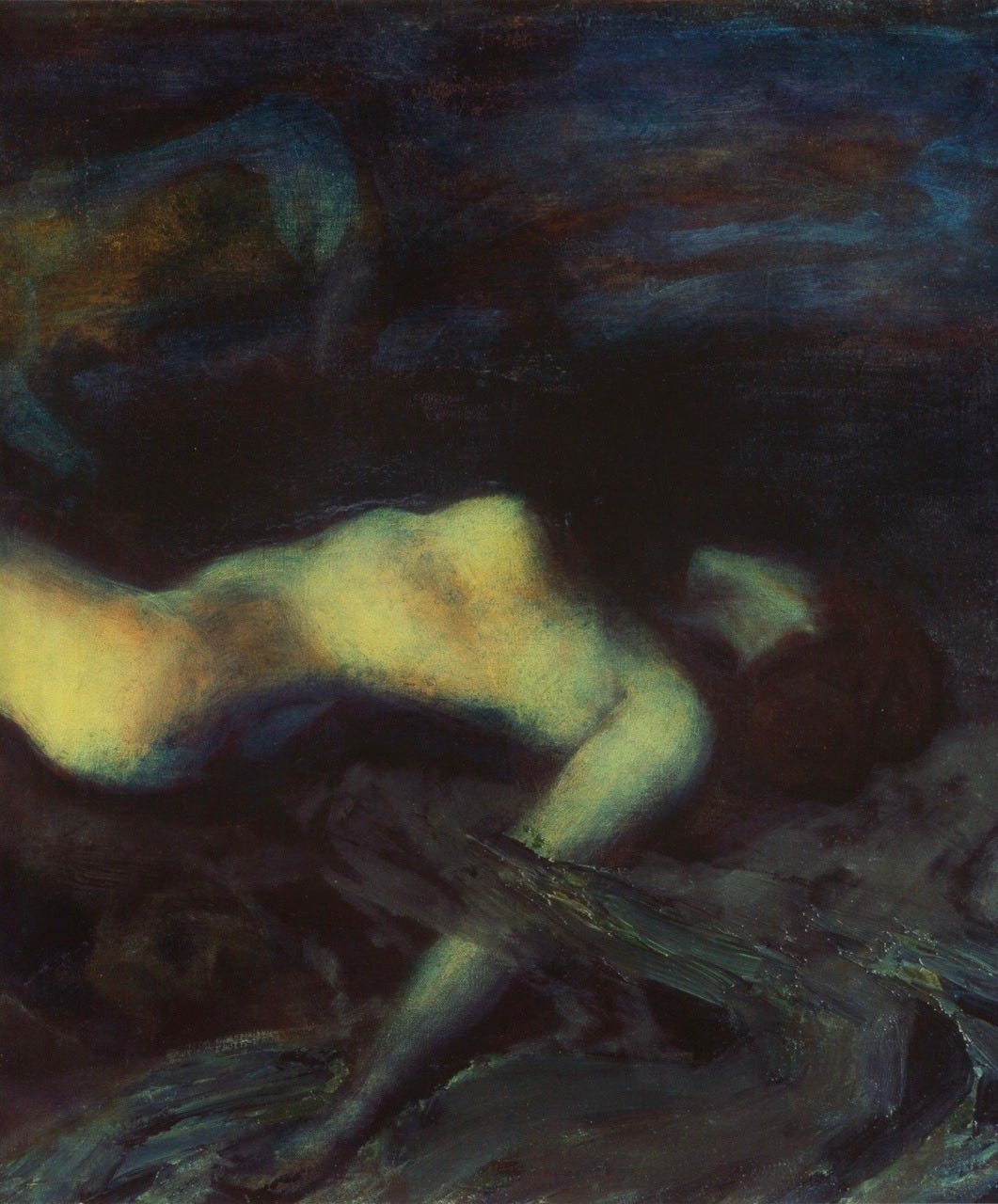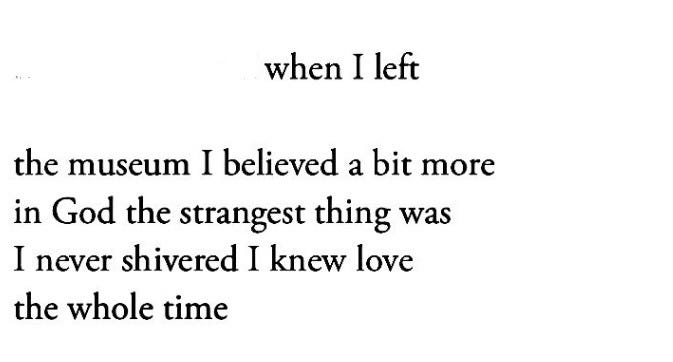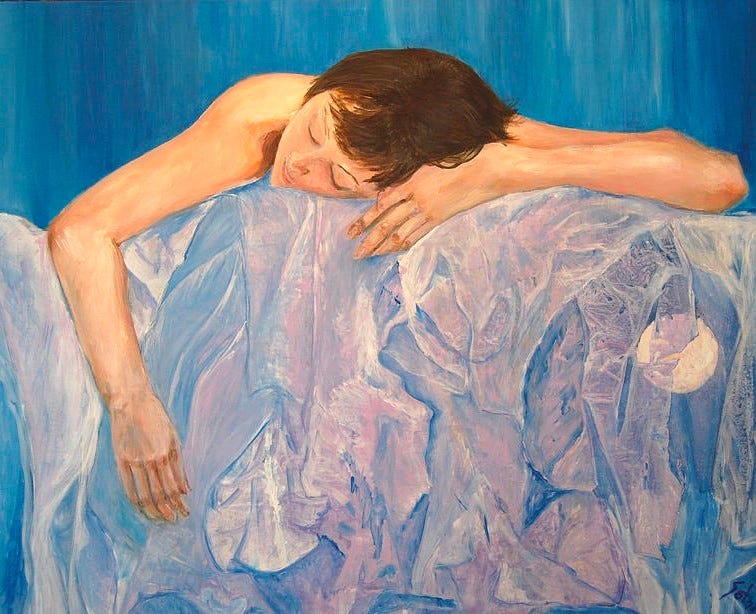the true life is elsewhere. we are not in the world.
but in order to see it, first you must imagine everything you can imagine. and then you must keep going.
dear little voice,
there is another world.
but in order to see it, first you must imagine everything you can imagine.
and then you must keep going.
soon, you will begin to feel yourself sliding, as if there are no solid things.
and that’s because there are not.
you are losing bones, you see. you are losing skin.
Such Sights as Youthful Poets Dream
illustrated by Walter Crane (1869)
it’s the only place you were ever born to go. but i cannot tell you what it looks like or how it breathes. sometimes it has the breathing of a river, and other times of the sun rising over cedars; that long and low and rested light. sometimes its sound come from under ice: the smile of a stalled sea’s silence. i have known it to ring out like a leaf turned suddenly at dawn, a peach or a cloud, pears on a shaking branch— like 4 o’clock sunlight when it begs you to dance. it can be the memory of a voice saying happiness. it can be the ash and dizziness of a candle in the dark. you can listen but you know that you will not hear it. you do not need to move to touch it. it does not like to be written down. search for it and you’ll miss it.
so it goes like this: you imagine everything you can imagine.
and then you keep going.
piece by small piece the world falls away from you as if spores from a milkweed pod, and everything you have known, and everyone you have known, is taken away in a wind of world-forgetting. this is the feeling of your blood Dreaming— its long, slow ache. the sensation of falling without the thud. painful but without pain. time neither shut up in dumb silence nor lucid and alive. only unimportant.
as Mark Strand writes: something nameless hums us into sleep.
Helen Lundeberg, The Veil (oil on board, 1947)
I am writing to you from a far-off country. writes french surrealist poet Henri Michaux, I am writing to you from the end of the world.
a Dream, in this way, is a Poem: a far-off country, or an end of the world as we understand it to be: a place where it becomes possible, suddenly, for the air to bloom from fierce belief only. where time passes softly and unworldly, things change from desire alone, all of it is listened to as if through a shell, a place where fruit ripens slowly and gazelles sleep side-by-side with wolves with no duty but to wallow in the wild plants.
and a Dream, like a Poem, is anything that is a consequence of your imagination.
it is something remaining itself. it is something becoming othered to what it is.
“[The world] needs to be reminded that the old fairy stories are rooted in truth, that imagination is of value, that happy endings do, in fact, occur, and that the blue spring mist that make an ugly street look beautiful is just as real a thing as the street itself.”
-Elizabeth Goudge
it is for this reason that when we meet in Art, we meet in Dreams: because both these spaces, little voice, are acts of translation.
i will explain to you with the story of a great translator: of Henry David Thoreau.
the story goes that Henry David Thoreau had two notebooks: one notebook for recording facts, and one notebook for recording Poetry.
this seemed like a very sensible decision until he began to have great difficulty deciding upon which to use at any given moment.
often, he found more Poetry within his facts and more Truth within his Poems.
Poetry, he began to realise, translates from the language of the earth into that of the Sky.
Thoreau knew something that Dreams do too: that the imagination relies upon reality to fabricate images and even delicate architectures. that it is not a process of invention— but rather one of translation.
one evening, gazing into a summer night, he spotted a star even lonelier than he was.
maybe, he wondered, that lonely star was a meeting place. maybe, he wondered, other lonely eyes were searching the same lonely Sky when they fixed on the same lonely star.
‘of what unsuspected triangles are stars the apex?’ he wrote that night.
i am not so sure in which book.
it’s why whether we look at a van gogh or a velázquez, a da vinci or a dante, we are struck not by the sameness of its world to our own, but of its otherness. it consists of the same material as our own world— of stars and insects and wheat and love; of time, kisses, safety and danger; of moons, thorns, mountains and tears— yet they have undergone a certain disordering translation, and they now seem to conceal a mystery that both confounds and comforts. like any translation, they feel at once both estranged from and intimate to the world we inhabit.
this is because they are something remaining itself, while becoming othered to what it is.
this is because it is a vibrant consequence of imagination: it is our World made of itself, into something Other than itself— the crook of the stars is suddenly a blurred and transcendental soup, the smile of a Mona Lisa becomes an invitation toward mystery, a man on a horse tugs at every unanswerable question you have posed to yourself.
an encounter with Art is an encounter with an Artist’s imagination— we know we are making contact with a Poem when we feel as though we are at the edge of the world; a place that is simultaneously familiar and strange; known and unknown.
and so we stand, sit, kneel, or crouch before it in all sad cry and gentle astonishment. why? because the world is so beautiful and we are so lonely. because the world is so terrifying and we love its strange miracle. regardless: when you encounter Art, you know: somehow, someone has milked the cosmos in secret, and what has survived is something going crazy with wings in your chest.
this in itself is an encounter with possibility— that the world itself can be translated, recreated, and transformed— that what is presented to you each day is not what you must accept, but rather a suggestion. that it is not yet the Art— not at all— but rather the raw material for your hands’ creation. that it is not a placid thing: but a responsibility entrusted to you.
that you are both Poem and Poet.
you will tell me now that you are not da vinci nor dante— not van gogh nor velázquez— and i will agree with you.
and i will be glad. because those translations have been made.
but i will also laugh.
i will laugh because you are a great translator all of the time. because your genius unmasks itself when you are least aware of it. because you call it mere sleeping.
we are, as a species, after all, addicted to this habit of creating art: of dreaming, of making strange, of whispering poems and telling stories.
even when your body goes to sleep, your mind stays up all night, telling itself stories. and you must not forget that there are, after all, a thousand far more practical faculties the mind could choose to keep running when the body falls asleep. instead, it sacrifices all safety, all awareness, and all survival for one thing only: dreams. imagination. poetry.
all of this is nothing short of evidence that this is the only thing you were ever born to do.
A newly-born lamb snuggles up to a sleeping boy, Photo by Williams/Fox Photos/Getty Images (England, March 1940)
much like a physical eye, imagination is a process of translating something that is ordinary and all around us.
for example, the eye translates light:
light meets the retina
special cells transform this material of illumination into electricity
this electricity travels through your nerves, to your thinking mind
your thinking mind creates the image you see.
it is true that we never make contact with the raw material of life; everything we know is a fiction of translation; a keen mirage of electricity and light.
for example, the imagination translates life:
light meets the retina
special cells transform this material of illumination into electricity
this electricity travels through your nerves, to your thinking mind
your thinking mind creates the image you see.
it is true that we never make contact with the raw material of life; everything we know is a delight of translation; a keen mirage of electricity and light.
as the poet rimbaud reminds us: the true life is elsewhere. we are not in the world.
we approach this door to the end of the world by process of translation: by translating the language of the earth into that of the sky.
Student asleep in Thomas, Bryn Mawr | via Bryn Mawr College Special Collections
there is a wonderful passage in Lewis Einstein’s preface to da Vinci’s Thoughts on Art and Life— a book i leap to recommend any dreamer, traveller, imaginer, or— and we must forgive them, little voice— skeptic:
Resting securely on the reality of experienced truth, da Vinci felt the deeper presence of the unreal on every side. In the same way that he visualized the inner workings of the mind, his keen imagination aided him to make outward trifles serve his desire to find mysterious beauty everywhere. Oftentimes, in gazing on some ancient, time-stained wall, he describes how he would trace thereon landscapes, with mountains, rivers and valleys. The whole world was full of a mystery to him, which his work reflected. The smile of consciousness, pregnant of that which is beyond, illumines the expression of Mona Lisa. So, too, in the strange glance of Ann, of John the Baptist, and of the Virgin of the Rocks, one realizes that their thoughts dwell in another world.
this far-off country of imagination is perhaps a place where some go more often than others— but not for expertise or skill. perhaps it is that it demands, instead, a growing suspicion in a little voice— a quiet intuition that what is presented to you is indeed only a suggestion— and that you have unfathomable powers of translation over it.
it is, little voice, a lingering suspicion that there is an end of the world as we know it to reach at all— and, as we know, it is endings that are always open. beginnings are the things that are closed.
Jean-Paul Jacques Favre de Thierrens (French, 1895-1973). Sleeping nude.
when i speak of restoring you to imagination i do so because it is a sacred site: a touchstone, a place of repair and a place of redemption. it is integrity and it is beauty. it is the joy of discovery and it is the truth of what is yet unknown to you. it is is the ecstasy of possibility and the limitlessness of play. it is a private dialogue with yourself. it is a performance of permission for others:
When I read the poems that matter to me, it stuns me how the presence of the heart—in all its forms—is endlessly available out there. To experience ourselves in an important way just knocks me out. It puzzles me why people have given that up for cleverness. Some of them are ingenious, more ingenious than I am, but so many of them aren’t any good at being alive.
- Jack Gilbert, in an interview with The Paris Review
being able to travel both ways— further into and further away from reality, and further into and away from imagination— matters deeply, but sometimes the way back into the heart of truth begins by going outward and beyond.
take half a step, little voice, out of the world, and you may reach the end of it: that far-off country. when you do, light will arrive, what is real will strike you and go— something inside of you will shudder and crack, break out and emerge sticky and wet. do not be afraid. this is the same feeling as being born.
the bigness of what you will meet outside of yourself is called your imagination, and it is a kind of redemption, you see. because you can no longer move into what is ordinary. because you can only move into what you do not now know. because you can only, from here, dream.
and your dream does not have to trend toward the extraordinary.
it does not even need to make a sound.
But perhaps there is something else as well, something nebulous, gauze-like through which everything one sees in a dream seems, paradoxically, much clearer. A pond becomes a lake, a breeze becomes a storm, a handful of dust is a desert, a grain of sulphur in the blood is a volcanic inferno. What manner of theatre is it, in which we are at once playwright, actor, stage manager, scene painter and audience?
— W. G. Sebald, The Rings of Saturn (New Directions; November 8, 2016) (via Alive on All Channels)
so, the time will come: you’ll be standing at the door and you’ll know there is another world. you’ll be leaving this place for a country of snow and apples. you do not have much time and there are things you cannot take with you. you wear the large rain jacket and the red boots. you do not have much time; your thinking-mind is heavy because it is full of thoughts— sticky, hefty, hard to shift.
then a feathery breeze in all white will come, a tree of white blossoms growing over the bed, all white blossoms washing the wind.
Yes, you will think, and your hands will become birds
Oh will say the thinking mind again and again I see and in the air the blossoms white will repeat and repeat I see
if you want to be alive, always, again and again, you will kneel by the blossom tree and its yellow hearts will shine at you and it is will be very quiet and something inside of you will listens as hard as it can listen and dream as hard as it can dream.
if you do this long enough you will find that you become so quiet that you are speaking.
the tree too could do it more neatly but it doesn’t.
love,
ars poetica.
“So come to the pond, or the river of your imagination, or the harbor of your longing, and put your lips to the world. And live your life.”
― Mary Oliver, from “Mornings at Blackwater” in Red Bird (Beacon Press, 2008)















Beautiful imagery
I can feel the breath of God with every stroke of this letter. Imagination is Otherness. It is derived from someplace not quite Earth or Sky. Dreams are similar to this analogy. We think and love with instinct. I felt guided by a soul's journey through the stars. Art has a way to force us to imagine more. We stare at a painting and the myriad of colours morph into symbols. There is something strange yet wonderful about this setting. I often wonder about the beauty of Death as well. The after life is as essential as the atoms surrounding us. Thank you for the myths as well as the facts. I believe in togetherness & duality no matter who is following whom.